π-not
Celebrating winter's end with some great Pinots. Is it Noir? Not necessary.

Concluding a long winter should indeed involve a variety of experiences, shouldn't it? And indeed, Pinot Noir offers ample flexibility for exploration, particularly when one delves into its numerous clones. For reasons that elude me, I had delayed this tasting session for quite some time. At times, certain elements were missing, or the bottles just didn't weave together into a cohesive narrative. However, the onset of spring served as a reminder that in the pursuit of perfection, it's all too easy to lose oneself and the sense of time. But wine tastings are not solely about the selection of wines; they're also about the people who will savour these artistic expressions. With this in mind, I selected the cornerstone wines for our evening (you can probably guess which ones made the cut), gathered a group of enthusiasts, and thus enriched our story.
The narrative is straightforward. Pinot Noir is a celebration of diversity and distinctiveness. What better way to celebrate life? It's time to greet the new season.
Naveran Cuvée Antonia Perles Rosés 2021 (welcome drink)
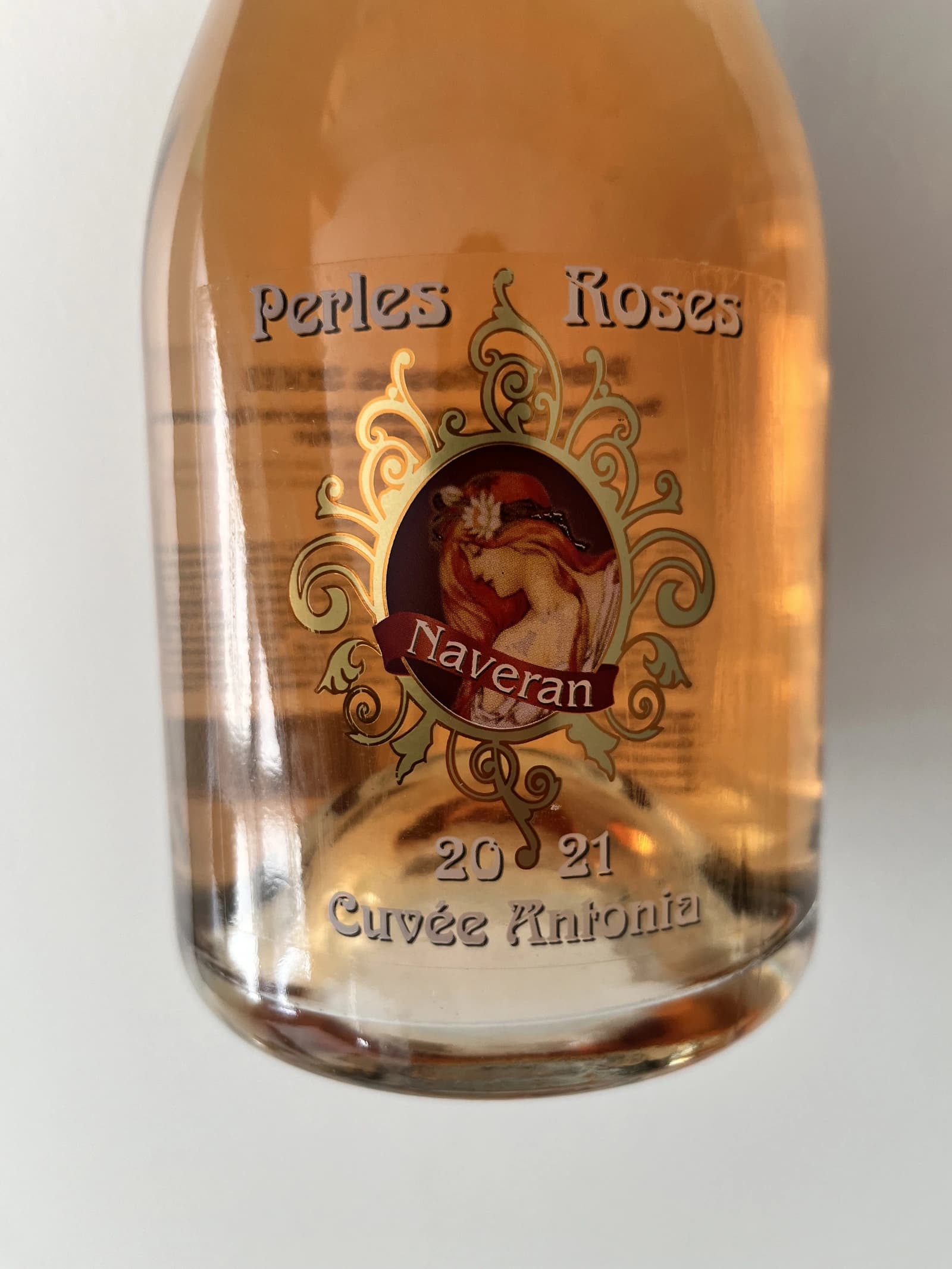
This wine secured the 🏅 8th place in our wine tasting lineup.
Wasenhaus Weissburgunder 2021
- Region
- Germany » Baden » Badischer Landwein
- Type
- white still, dry
- Producer
- Wine
- Vintage
- 2021
- Grapes
- Weissburgunder
- Alcohol
- 12
- Volume
- 750 mL
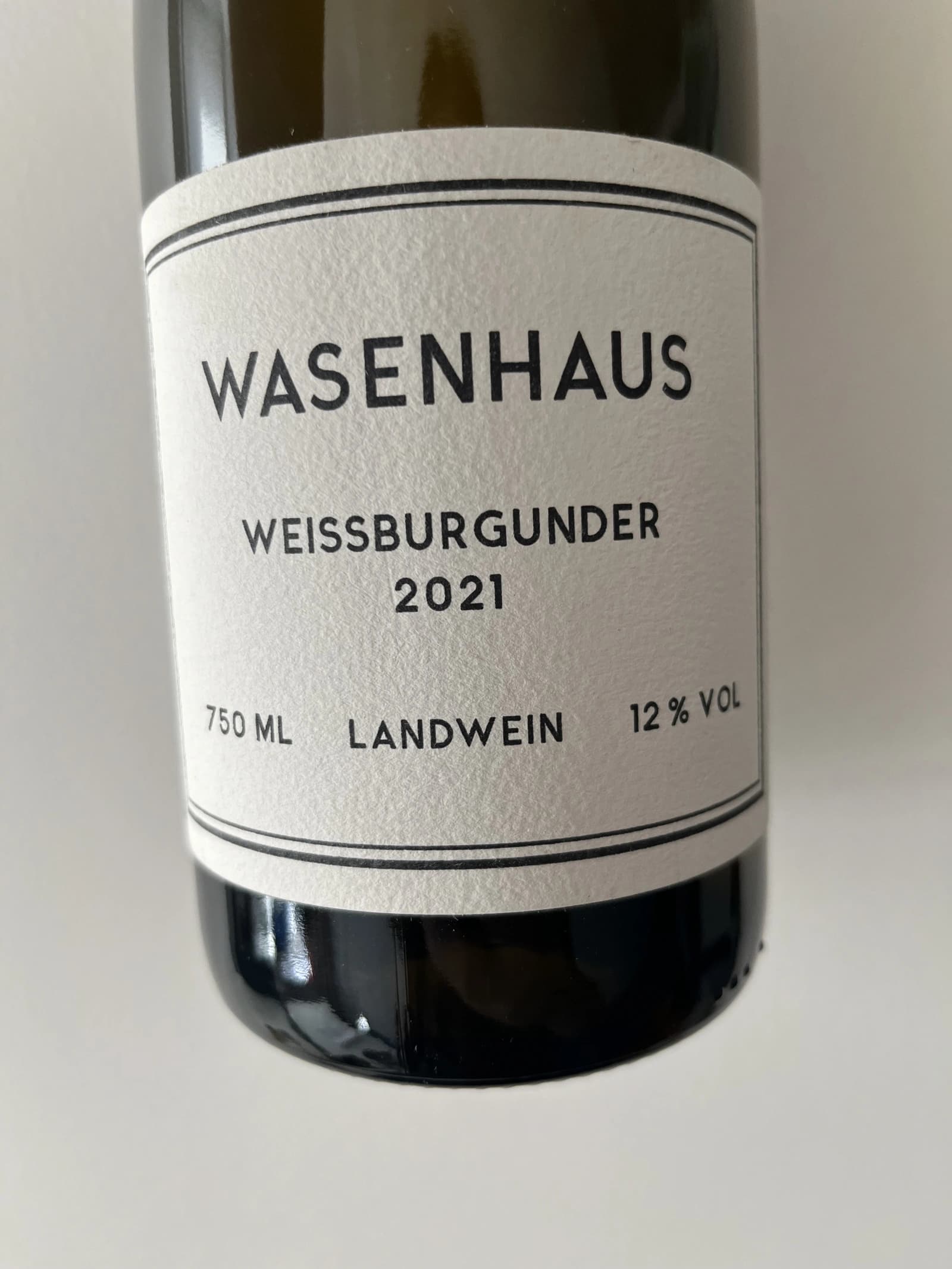
This wine secured the 🏅 5th place in our wine tasting lineup.
At a Glance
- Founders' Burgundian Heritage: Christoph Wolber and Alexander Götze, founders of Wasenhaus, bring extensive experience from prestigious biodynamic estates in Burgundy, influencing their winemaking philosophy and techniques in Baden, Germany.
- Focus on Terroir and Organic Practices: Wasenhaus is renowned for its meticulous selection of vineyards with old vines and unique parcels, emphasizing organic farming and biodynamic principles to reflect the distinct terroir of Baden.
- Minimal Intervention Winemaking: The winery champions gentle extractions, judicious use of sulfur post-malolactic fermentation, and aging in oak barrels, aiming for wines that express purity, complexity, and the essence of their vineyards.
- Weissburgunder 2021 is 100% Pinot Blanc. Whole bunch fermentation in barrels of different sizes. Ageing lasts for 12 months in barrels on lees and 6 months in stainless steel vats also on lees.
Wasenhaus, a winery in Baden, Germany, marks a unique venture in the wine world, rooted deeply in both German soil and Burgundian tradition. Founded by Christoph Wolber and Alexander Götze, who met during their enological studies in Burgundy, their journey from roommates to co-founders of Wasenhaus encapsulates a shared vision for wine-making that combines their German heritage with the profound influence of their Burgundian apprenticeships. Their decision to establish the winery in Baden was driven by a desire to explore the potential of this region, leveraging their extensive experience from some of the most respected biodynamic estates in Burgundy. They carefully selected plots in Baden, focusing on areas such as the slopes of the Ehrenstettener Oelberg and Ehrenkirchener Kirchberg, and have since expanded their holdings to include vineyards with very old vines. Their winemaking approach, emphasizing gentle extractions and minimal intervention, reflects a deep respect for the terroir and a commitment to expressing the unique character of their vineyards. The use of oak barrels for ageing, judicious application of sulfur, and a focus on old vines and clones are a testament to their meticulous approach to crafting wines that resonate with the essence of their chosen land.
What sets Wasenhaus apart is not just their background or their methods, but the palpable connection between the wines they produce and the lineage of Burgundian viticulture. Despite being firmly planted in German soil, their wines, particularly the Pinot Noirs, evoke comparisons to the revered Pinot Noirs of Burgundy, a testament to both the quality of their craftsmanship and the potential of Baden as a wine-producing region. This blending of influences is further enriched by the diversity of Baden's terroir, from löess-covered hillsides to a variety of soil types that contribute to the complexity and uniqueness of Wasenhaus wines. Their commitment to rediscovering and nurturing old clones and vines within this diverse landscape speaks to a broader ambition: to redefine the voice of Pinot Noir and other varietals within the context of Baden's rich geological and climatic tapestry. In doing so, Wasenhaus not only challenges perceptions of German wine but also pays homage to the historical and cultural connections that link this region to the broader narrative of European winemaking.
The Weissburgunder 2021 is made from Pinot Blanc from plots on the Kaiserstuhl and plots south of Staufen on loess soil. The grapes are pressed directly in whole bunches and are fermented in barrels of different sizes and several wines. Ageing lasts 12 months in barrels on lees and 6 months in stainless steel vats also on lees.
Bernhard Huber Malterdinger Rot 2018
- Region
- Germany » Baden » Qualitätswein
- Type
- red still, dry
- Producer
- Wine
- Vintage
- 2018
- Grapes
- Spätburgunder
- Alcohol
- 13
- Sugar
- 1.3
- Volume
- 750 mL
- Find at
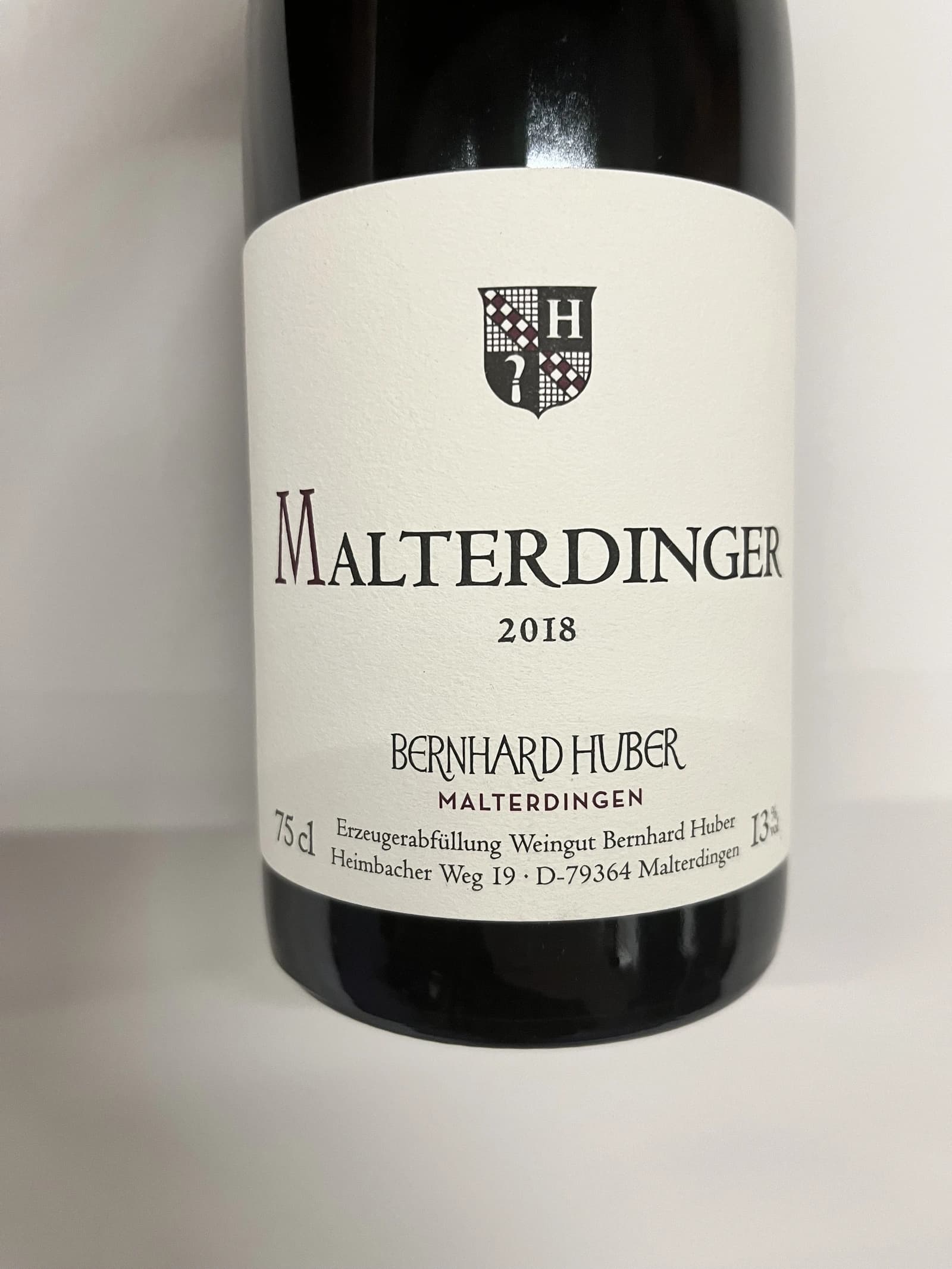
This wine secured the 🏅 4th place in our wine tasting lineup.
At a Glance
- Legacy of Pinot Noir: Bernhard Huber was pivotal in the recognition of German Pinot Noir on the global stage, leveraging Malterdingen's unique terroir that mirrors Burgundy's, to produce wines that often rival their French counterparts in quality and complexity.
- Continuation of Excellence: The winery is currently led by Julian Huber, who embodies a dynamic blend of his father's profound legacy and his own innovative approach to winemaking, aiming to enhance the estate's reputation for crafting exquisite Pinot Noir.
- Philosophy of Winemaking: The Huber estate focuses on dry wines, allowing full fermentation and long lees contact.
- Malterdinger 2018: village wine from young grapes. 12 months of ageing in used and new barriques.
The Bernhard Huber winery, situated in the historic wine-growing village of Malterdingen in Baden, Germany, carries a legacy deeply rooted in the tradition of Pinot Noir cultivation, a practice initiated by Cistercian monks over 700 years ago. These monks, recognizing the similarity of Malterdingen's shell limestone weathered soil to that of Burgundy, introduced Pinot Noir to the region, setting a precedent for excellence. Bernhard Huber, often hailed as the German Godfather of Pinot Noir, was instrumental in elevating the status of German Pinot Noir to world-class standards, drawing comparisons to the esteemed wines of Burgundy due to the region's cool climate and limestone soils. His commitment to producing predominantly dry wines through complete fermentation and extended yeast contact has been a hallmark of the estate's philosophy.
Today, the winery is under the stewardship of Julian Huber, Bernhard's son, who continues to uphold the family's winemaking legacy while also infusing his own vision into the estate's operations. Julian's approach, shaped by his education and experiences, both at home and in the Côte d'Or, reflects a blend of reverence for tradition and a forward-looking perspective on winemaking. Under his guidance, the winery has seen subtle yet significant innovations, further refining the balance, subtlety, and complexity of their Pinot Noirs. The Huber estate's commitment to capturing the essence of Malterdingen's terroir, alongside Julian's burgeoning talent and respect for his father's groundwork, ensures that Bernhard Huber's legacy thrives, continuing to produce Pinots that are both powerfully expressive and elegantly restrained.
The 2018 Bernhard Huber Malterdinger Pinot Noir is a village wine. The grapes come from vines between 8 and 25 years old growing in soil composed of weathered shell limestone and a thin layer of loess clay. About 30-35% are whole bunch fermented. After the traditional must fermentation, this wine is mainly aged in first-, second-, and third-use barriques and is bottled without filtration for 12 months.
Paraschos not special vintage 2012
- Region
- Italy » Friuli-Venezia Giulia » IGP Venezia Giulia
- Type
- white still, dry
- Producer
- Vintage
- 2012
- Grapes
- Pinot Grigio
- Alcohol
- 14
- Volume
- 750 mL
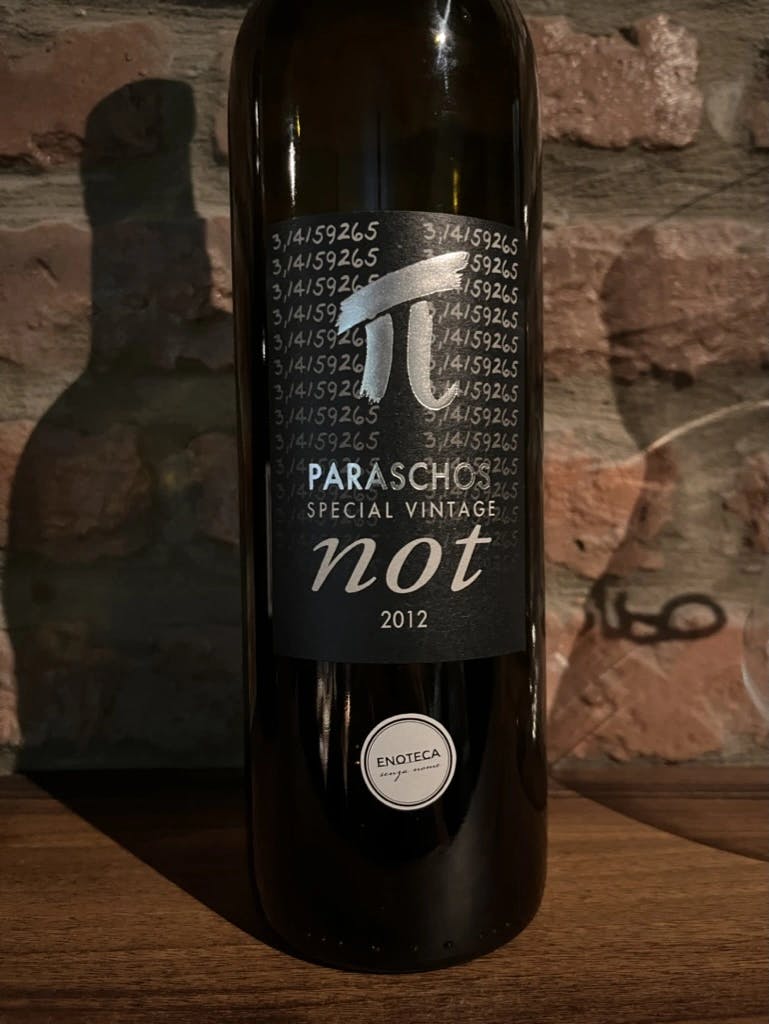
This wine secured the 🏅 6th place in our wine tasting lineup.
At a Glance
- Evangelos Paraschos is a winemaker from Italian/Slovene border with Greek origin. Together with his kids he runs the winery. The brothers are true polyglots: they speak Greek with their father, Italian between themselves, Slovene with their workers, and English with most of their clients.
- He fell in love with wines of his neighbours and that inspired him to start making wines.
- 7 hectares of vineyards growing on unique soil called "Ponca", based on marlstone rich in minerals of Eocene origin.
- The 2012 not special vintage is 100% Pinot Grigio that is red in colour.
Evangelos Paraschos was running a family restaurant. This is where he tasted and fell in love with the wines of his neighbours - Gravner and Radikon. This inspired him to start a winery in the 1990s.
Today, the winery is run by brothers Alexis and Jannis Paraschos and their father Evangelos. With Greek origin and the Italian/Slovene border situation, the brothers speak Greek with their father, Italian between themselves, Slovene with their workers, and English with most of their clients.
The 7 hectares owned by Paraschos are divided among 10 terraced vineyards in Slatnik, between San Floriano and Oslavia, on a typical and unique soil called "Ponca", based on marlstone rich in minerals of Eocene origin. The family cultivates Ribolla Gialla, Friulano, Malvasia Istriana, Pinot Grigio, Merlot and Pinot Noir.
The hot 2012 vintage resulted in slightly dried grapes. The 'white' grape was turned into red wine through late harvest, long maceration, and longer than usual ageing in old Slavonian oak barrels (36 months).
Domaine Michel Gaunoux Beaune 2017
- Region
- France » Burgundy » Côte d'Or » Côte de Beaune » Beaune AOC
- Type
- red still, dry
- Producer
- Wine
- Vintage
- 2017
- Grapes
- Pinot Noir
- Alcohol
- 12.5
- Sugar
- 0.1
- Volume
- 750 mL
- Find at
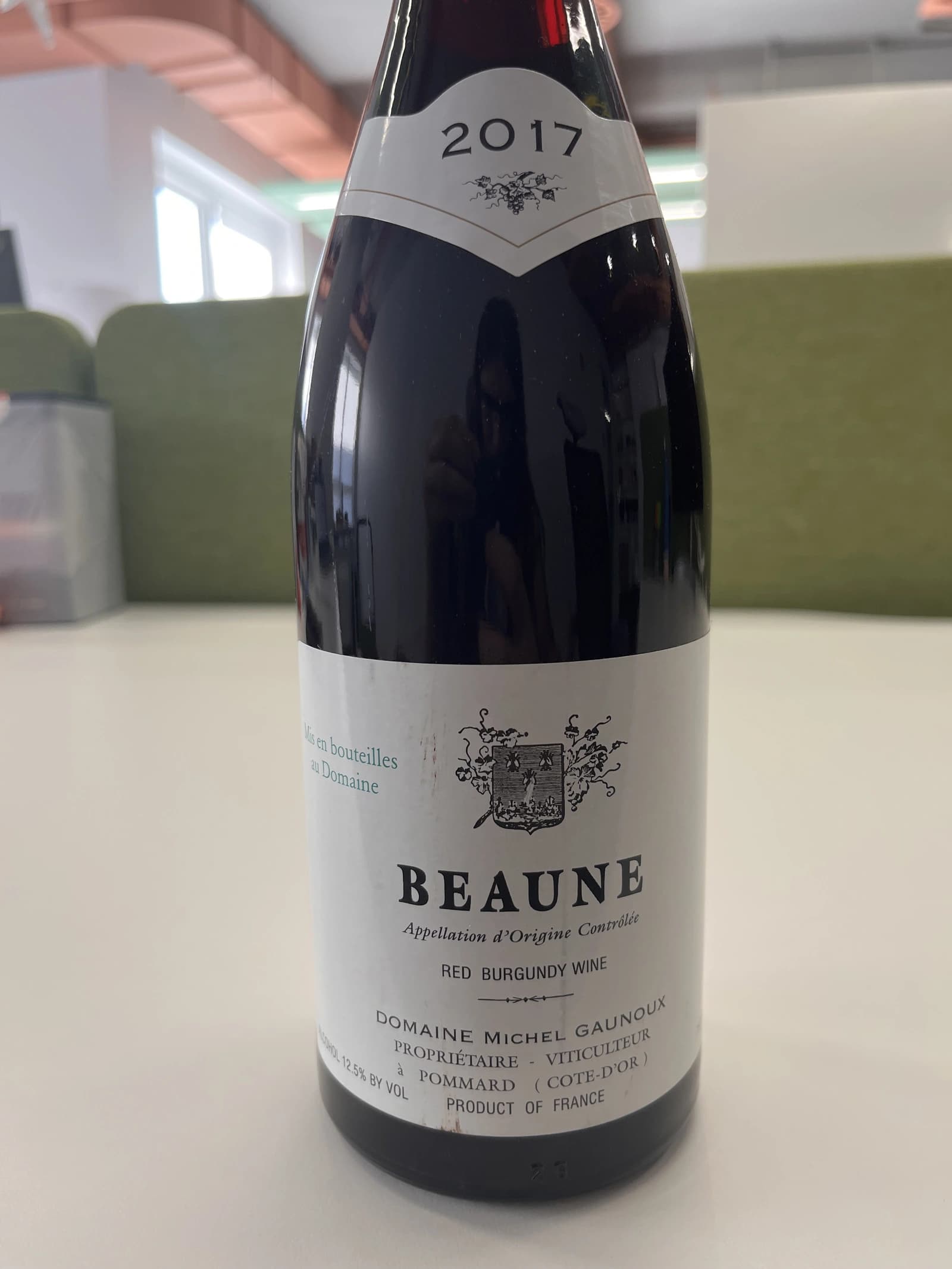
This wine secured the 🥉 3rd place in our wine tasting lineup.
At a Glance
- Heritage and Terroir: Domaine Michel Gaunoux boasts a rich lineage in winemaking within Burgundy's prestigious Pommard region, managing vineyards across multiple appellations with a focus on expressing the nuanced terroir of each site.
- Traditional Winemaking: Adherence to traditional practices, including low yields, no pesticide use, and minimal new oak, highlights the domaine's commitment to producing Pinot Noirs of exceptional quality and aging potential.
- Accessible Excellence: Despite the domaine's storied legacy and the complexity of its wines, Michel Gaunoux remains dedicated to offering wines that are not only profound and evocative but also represent great value, ensuring they are within reach of a broader audience.
Domaine Michel Gaunoux, entrenched in the heart of Pommard, Burgundy, epitomizes the quintessence of Pinot Noir through a legacy that intertwines tradition with the meticulous stewardship of its vineyards. The domaine, with roots deeply embedded in the Côte d'Or for centuries, commands respect for its adherence to time-honoured winemaking practices, underpinned by a philosophy of minimal intervention. Jean-Michel Gaunoux, steering the domaine into the modern era, cultivates prime parcels across Meursault, Pommard, Puligny-Montrachet, and Volnay, including esteemed Premier Cru sites in Meursault. His approach, focusing on green harvesting for low yields and eschewing pesticides in vineyard management, underscores a commitment to expressing the purest essence of terroir.
The wines of Domaine Michel Gaunoux are lauded for their profound complexity and remarkable ageing potential, a testament to Jean-Michel's dedication to traditional vinification methods. With a restrained use of new oak and a firm stance against filtering and fining, these wines encapsulate the rich tapestry of Burgundy's soils, marrying dark earthy fruit notes with fresh minerality and an elegant length. Despite their storied quality and depth, Gaunoux's offerings remain accessible, offering exceptional value. This paradox of ultra-traditional winemaking yielding wines of unmatched grace, yet flying under the radar, positions Domaine Michel Gaunoux as a treasure trove for connoisseurs and casual enthusiasts alike.
The 2017 Beaune is a blend of 1er Crus Les Boucherottes and Les Epenotes from lieu-dits Les Prévoles and Les Beaux Fougets, which makes this 'village' wine quite prestigious. The fruit is hand-harvested, sorted and destemmed before vinification in big oak barrels using only indigenous yeasts with prolonged maceration. Ageing occurs in barriques with a small percentage of new oak.
Domaine Trapet Père et Fils Gevrey-Chambertin Ostrea 2012
- Region
- France » Burgundy » Côte d'Or » Côte de Nuits » Gevrey-Chambertin AOC
- Type
- red still, dry
- Producer
- Vintage
- 2012
- Grapes
- Pinot Noir
- Alcohol
- 12.5
- Volume
- 750 mL
- Find at
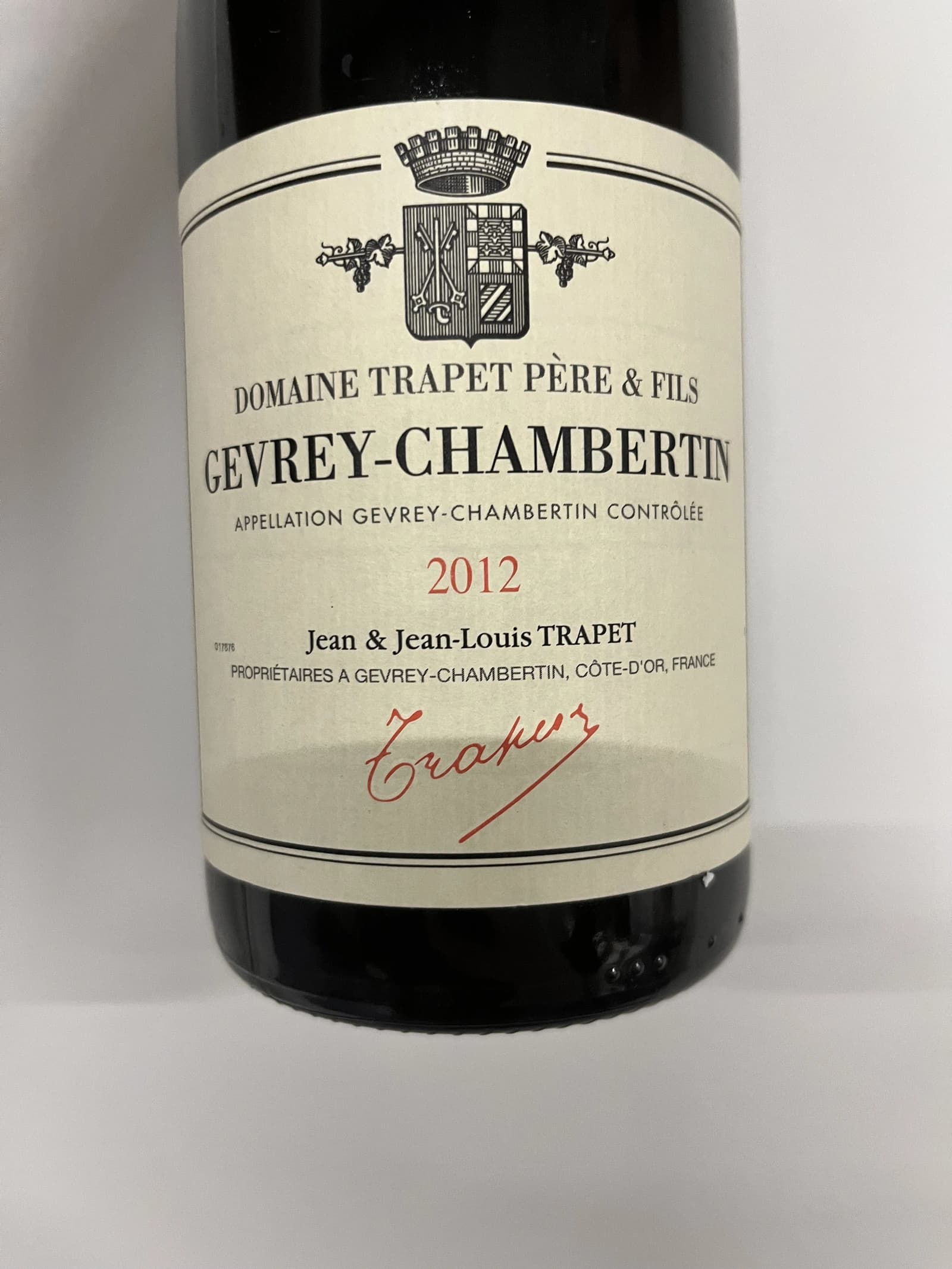
This wine secured the 🥇 1st place in our wine tasting lineup.
At a Glance
- Legacy of Innovation: Domaine Trapet Père et Fils' historical contribution to Burgundy's viticulture, especially during the phylloxera crisis, underscores a legacy of innovation and resilience, with a commitment to biodynamic practices leading the way in natural viticulture within the region.
- Biodynamic Excellence: Under Jean-Louis Trapet, the estate has embraced biodynamic farming, earning Demeter certification and producing wines that reflect a profound connection to the land, showcasing the purity and elegance of Gevrey-Chambertin's terroir.
- Artisanal Winemaking: The domaine's nuanced approach to winemaking, including the strategic use of whole cluster fermentation and minimal new oak, articulates a vision where finesse and terroir transparency are paramount, crafting Pinot Noirs of unparalleled complexity and ageing potential.
- The 2012 Gevrey-Chambertin Ostrea comes from four fossils-rich parcels located near the Brochon border. These parcels were planted in 1919. The name "Ostrea" comes from the oyster shells that are found in and around these parcels.
Domaine Trapet Père et Fils, a beacon of heritage and innovation in Gevrey-Chambertin, represents the pinnacle of Pinot Noir craftsmanship through seven generations of dedication to the vine. Renowned for its significant holdings in Chambertin, the estate's lineage is marked by resilience and pioneering spirit, notably during the phylloxera crisis when Jean-Louis' great-grandfather undertook illegal vine grafting to preserve their legacy. This bold act not only safeguarded their own vineyards but also contributed to the survival of Burgundian viticulture. Today, under Jean-Louis Trapet's guidance, the domaine stands as a testament to the virtues of biodynamic farming, harmonizing with nature to produce wines that are celebrated for their purity, complexity, and elegance, diverging from the appellation's tendency towards power.
Jean-Louis Trapet's approach in the cellar is as thoughtful as it is in the vineyard, with a clear focus on expressing the authentic character of their terroir. Through the judicious use of whole cluster fermentation, tailored to the nuances of each vintage, and a restrained application of new oak, Trapet ensures that the intrinsic qualities of their esteemed vineyards shine through. The domaine's portfolio spans from the accessible charm of their Bourgogne Passetoutgrain and Rouge, through a commendable range of Premier Crus, to the profound depth of their Grand Crus—Latricières-Chambertin, Chapelle-Chambertin, and Chambertin. Each wine is a narrative of its origin, woven with threads of aromatic complexity, flavour depth, and potential for graceful ageing, emblematic of Jean-Louis Trapet's virtuosity.
The 2012 Gevrey-Chambertin Ostrea is made from grapes that come from four fossils-rich parcels located near the Brochon border. These parcels were planted in 1919. The name "Ostrea" comes from the oyster shells that are found in and around these parcels. The vines are farmed using biodynamic practices and all grapes are harvested by hand. They are sorted once in the vineyard and again in the winery, with up to 10% of the crop being rejected. The wine is made using traditional methods, with open vat fermentation using native yeasts, 30% stem inclusion and minimal use of sulphur. It is aged in French barriques, of which 30-75% is new depending on the vintage.
Timo Mayer Dr Mayer Pinot Noir 2020
- Region
- Australia » Yarra Valley
- Type
- red still, dry
- Producer
- Vintage
- 2020
- Grapes
- Pinot Noir
- Alcohol
- 13
- Volume
- 750 mL
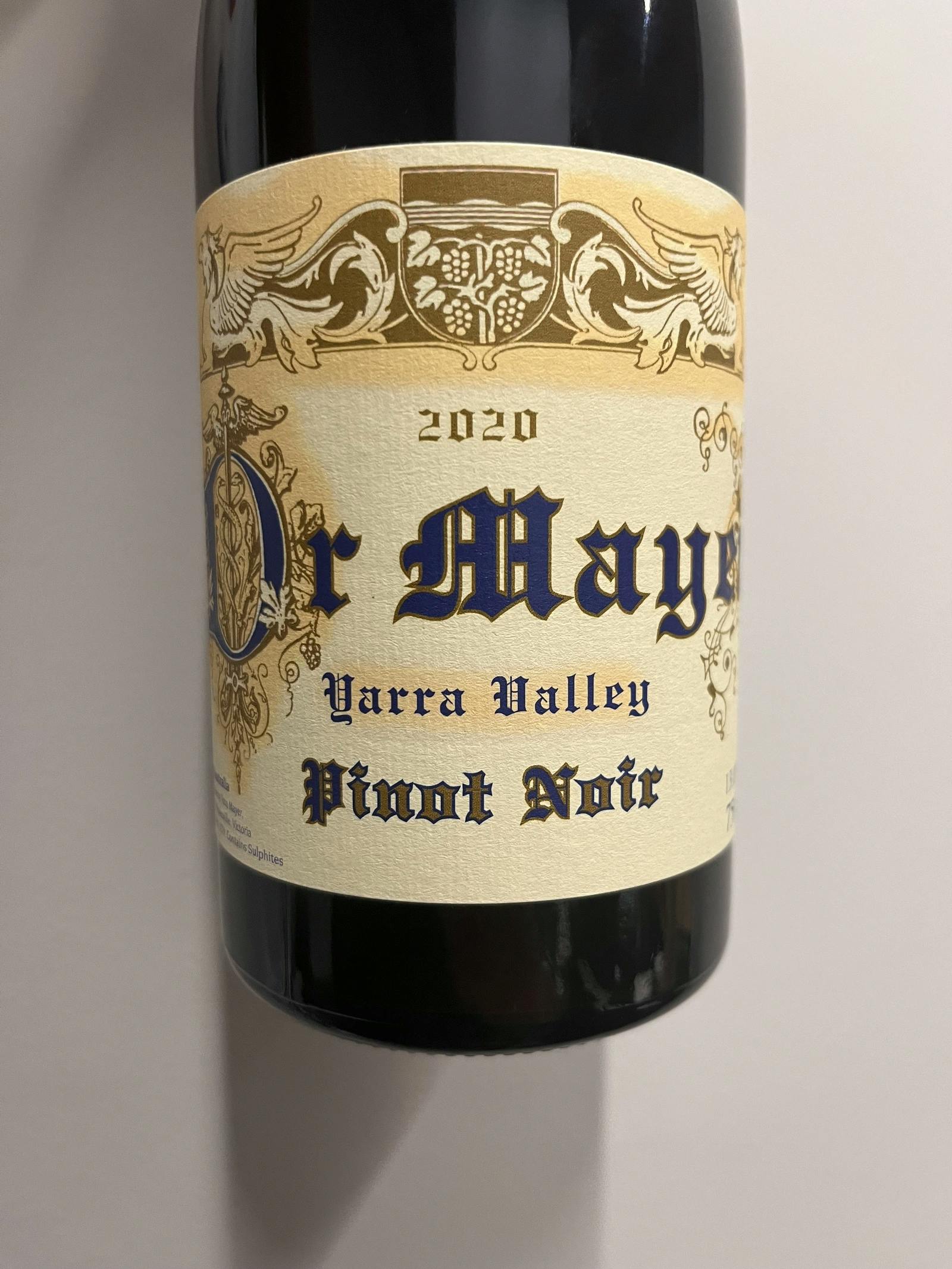
This wine secured the 🥈 2nd place in our wine tasting lineup.
At a Glance
- Innovative Winemaking: Timo Mayer has revolutionized winemaking in the Yarra Valley with his pioneering use of whole bunch fermentation, adding unprecedented complexity and freshness to his wines.
- Challenging Convention: With a history rooted in German winemaking, Mayer has boldly diverged from tradition, embracing the steep and demanding terrain of 'Bloody Hill' to cultivate distinctive cool-climate varieties and experimenting with atypical Yarra Valley grapes.
- Elegance and Purity: Mayer's wines are celebrated for their elegance, purity, and unique character, distinguishing his portfolio as among Australia's finest, particularly his Pinot Noir, which is considered a benchmark in Australian viticulture.
- The Doktor Pinot Noir is 100% whole bunch in open vats. The wine is aged for 11 months in French Hogsheads.
Timo Mayer has carved a distinctive niche in the Yarra Valley, Australia, with a winemaking ethos that marries his 400-year familial legacy in Germany with the pioneering spirit of his adopted homeland. Eschewing traditional German winemaking methods, Mayer embarked on a journey to "Bring back the funk" to the vineyards of the Yarra Valley, establishing his own winery on the aptly named 'Bloody Hill'. This challenging terrain, notorious for its steep incline, has become the bedrock for Mayer's ventures into cool-climate varieties, notably Pinot Noir and Chardonnay, which have thrived under his care. His adoption of whole bunch fermentation in 2004 marked a significant departure from the norm in Australian viticulture, introducing a layer of complexity and texture to his Pinot Noir that was both critically acclaimed and met with scepticism.
Mayer's philosophy extends beyond just winemaking techniques; it's an invitation to explore the uncharted territories of viticulture in the Yarra Valley. His experimentation with varieties uncommon in the region, such as Nebbiolo and Gamay, underscores a commitment to diversity and experiments. Mayer's wines are lauded for their elegance, purity, and the distinctive character imparted by whole bunch fermentation, particularly his Syrah, which stands as a testament to the technique's transformative impact on flavour and structure. Despite the small-scale production from his 2.5-hectare plot on Bloody Hill and other select vineyard sites, Mayer's wines have garnered a reputation for their exceptional quality, making them sought-after treasures in the world of Australian wine.
The Doktor Pinot Noir is sourced from Timo's infamous "Bloody Hill" vineyard 200 meters above sea level. This wine is similar to his other Pinot — Close Planted — except it is made with 100% whole bunch in open vats. The wine is aged for 11 months in French Hogsheads.
Pierre Frick Pinoit Gris Macération Pur Vin 2020
- Region
- France » Alsace » Alsace AOC
- Type
- white still, dry
- Producer
- Vintage
- 2020
- Grapes
- Pinot Gris
- Alcohol
- 13
- Volume
- 750 mL
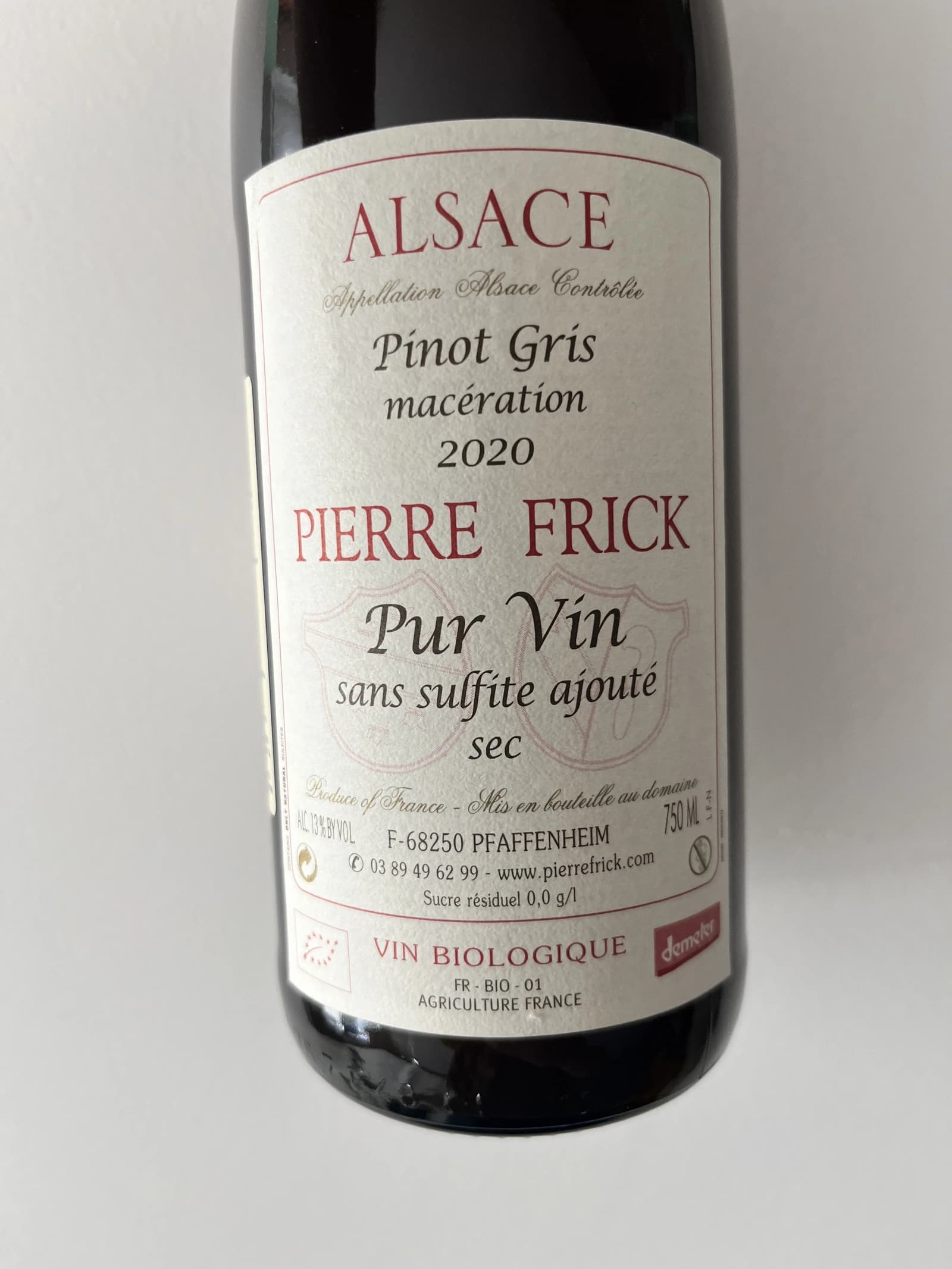
This wine secured the 🏅 9th place in our wine tasting lineup.
At a Glance
- Natural Winemaking Pioneer: Pierre Frick is a trailblazer in natural and biodynamic winemaking in Alsace, with a family legacy deeply rooted in organic practices since the 1970s and biodynamic cultivation from 1981.
- Diverse and Expressive Terroirs: The Frick estate boasts a rich mosaic of limestone terrains across Alsace, producing wines that vividly articulate the unique characteristics of their Grand Cru sites and other distinguished plots.
- Innovation and Authenticity: Committed to authenticity and quality, Pierre Frick's wines are notable for their no added sulphur approach and innovative bottling practices, offering a pure and unfiltered experience of Alsace's varietal richness.
- Pinoit Gris Macération is macerated for 7 days before pressing. After vinification, the wine is aged for 7 months in old barrels on fine lees.
Pierre Frick, a name synonymous with the avant-garde of natural winemaking in Alsace, France, has cemented his legacy over twelve generations, cultivating an indelible connection to the vine. With a sprawling estate of 12 hectares meticulously overseen by Jean-Pierre, Chantal Frick, and their son Thomas, the Frick family has become a beacon of organic and biodynamic viticulture since the early 1970s. Pierre and his wife Annette were early adopters of organic farming, a commitment that extended to biodynamic practices in 1981, well ahead of the curve, ensuring the health of their soil, vines, and the wines they produce.
The Frick vineyards span a variety of limestone terrains across a 15 km expanse, featuring distinguished plots like the Grand Cru Steiner (Pfaffenheim), Grand Cru Vorburg (Ruffach), and Grand Cru Eichberg (Eguisheim), among others. These diverse terroirs, varying in soil composition and exposure, are the foundation upon which the Fricks build their remarkable wines, celebrated for their purity, vitality, and expression of place. Notably, Pierre Frick's wines are renowned for their no added sulphur variants, a testament to their dedication to producing wines that are as natural as they are expressive. Since 1999, the Fricks have vinified and bottled wines without the addition of sulphites, offering an unadulterated taste of Alsace's varietal spectrum, including the elusive Blanc de Noir and sweet wines, capturing the essence of the vineyard's fruit.
Pierre Frick's commitment to natural winemaking extends beyond the vineyard and cellar practices to include innovations like the use of bottle caps instead of corks, a decision aimed at reducing the loss associated with corked wines. This pragmatic yet pioneering approach has not only preserved the integrity of their wines but also highlighted the Fricks' forward-thinking ethos. As a result, Pierre Frick's wines, especially his age-worthy Rieslings, Pinot Gris macerations, and exquisite Crémants, stand as a hallmark of excellence in natural winemaking, inspiring wine enthusiasts and winemakers worldwide with their elegance, complexity, and unwavering authenticity.
This Pinot Gris is macerated for 7 days before pressing. After vinification, the wine is aged for 7 months in old barrels on fine lees.
Elk Cove La Bohème Pinot Noir 2019
- Region
- USA » Oregon » Yamhill-Carlton AVA
- Type
- red still, dry
- Producer
- Vintage
- 2019
- Grapes
- Pinot Noir
- Alcohol
- 14.5
- Volume
- 750 mL

This wine secured the 🏅 7th place in our wine tasting lineup.
At a Glance
- Pioneering Family Legacy: Founded by Pat and Joe Campbell in 1974, Elk Cove Vineyards remains family-owned, with Adam Campbell leading the winery into its next chapter, blending traditional methods with modern viticulture.
- Sustainable and Hand-Crafted Excellence: With a focus on Estate-grown wines, Elk Cove emphasizes sustainable farming, ensuring each bottle reflects the unique terroir of their Oregon vineyards.
- Innovative Viticulture: Utilizing "selection massale" and managing high-elevation, south-facing vineyards, Elk Cove crafts exceptional single vineyard Pinot Noirs from its premier blocks, La Bohème and Roosevelt, showcasing the depth and complexity of their chosen varietals.
Elk Cove Vineyards, established in 1974 by Pat and Joe Campbell and now helmed by their son, winemaker Adam Campbell, is a testament to family-driven craftsmanship and dedication in the heart of Oregon's wine country. From its inception on an overgrown homestead in the Coast Range Mountains, Elk Cove has grown from a pioneering venture into a cornerstone of Oregon viticulture, known for its hand-crafted, Estate-grown wines that stand among the world's finest. The Campbell's selection of the property for its challenging yet rewarding terrain laid the foundation for a winery that values the unique character imparted by its environment, a principle that has guided their practices for over four decades.
Under Adam's stewardship, Elk Cove has expanded to encompass six vineyard sites across 380 planted acres, a significant leap from Oregon's nascent wine industry days. This expansion includes the notable La Bohème and Roosevelt vineyards, which are instrumental in producing Elk Cove's most coveted Single Vineyard Pinot Noirs. The winery's commitment to sustainable farming, alongside innovative techniques like "selection massale" for vine propagation, underscores a deep respect for the land and a dedication to quality. The Estate's marine sedimentary soil, high elevation, and south-facing slopes are meticulously managed to enhance vine health and flavour concentration, contributing to the distinct profile of Elk Cove wines.
Elk Cove stands as a beacon of innovation and tradition in Oregon's wine scene, with Adam Campbell continuing the legacy of producing cool climate wines that rival global benchmarks. The winery's journey from a family's ambitious dream to a celebrated estate reflects a steadfast commitment to excellence and an enduring love for the craft of winemaking.
La Bohème Vineyard, nestled within the scenic embrace of the Willamette Valley, stands as a testament to the visionary planting initiated by Pat and Joe Campbell in 1985. With its roots extending deep into the history of Elk Cove Vineyards, La Bohème was cultivated from the most promising vines of the estate's original Pommard plantings. The Campbells, drawing inspiration from both the previous landowners and a cherished Puccini opera, bestowed upon the vineyard a name that echoes with artistic heritage and familial legacy. Situated at an elevation of 240 meters, La Bohème not only commands breathtaking views of the coast range mountains but also benefits from one of the highest vineyard sites in the valley, ensuring optimal sun exposure and air circulation. This strategic location, combined with rigorous pruning and cluster thinning, aims to limit yields and enhance ripening and flavour concentration, marking La Bohème as a source of Pinot Noir that is as distinctive in character as it is in quality.
The 2019 vintage at Elk Cove's La Bohème Vineyard presented a unique set of challenges and opportunities, encapsulating the essence of winemaking resilience and expertise. The season's extended hang times, stretching up to 125 days for some blocks, were a calculated risk that bore fruit under the vigilant care of Winemaker/Owner Adam Campbell and his team. This approach, underscored by meticulous months-long vineyard preparation and a steadfast refusal to hasten the harvest, culminated in a crop with optimal sugar levels and concentrated fruit. In the winery, the La Bohème Pinot Noir benefits from Elk Cove's gravity flow system, ensuring minimal intervention and maximum flavour preservation. Fermentation takes place in small, temperature-controlled steel tanks with manual punch-downs, followed by ten months of ageing in French oak barrels. This careful, hands-on process is reflective of Elk Cove's commitment to expressing the unique terroir of La Bohème, aiming to produce a Pinot Noir that is emblematic of the vineyard's high elevation and the winery's dedication to quality.
Resources
- Weingut Wasenhaus. Clos de Millesimes.
- Wasenhaus. The Source Imports.
- Wasenhaus. Vom Boden.
- Bernhard Huber Malterdingen Pinot Noir 2019. The Vine Press.
- Bernhard Huber, Malterdinger Spatburgunder 2021. The Good Wine Shop.
- Bernhard Huber. Weinthum.
- Paraschos. Jenny & François selections.
- Paraschos.
- Domaine Michel Gaunoux. Berry Bros & Rudd.
- Trapet Père et Fils. Polaner Selections.
- Timo Mayer. Indigo Wines.
- Timo Mayer. More Natural Wines.